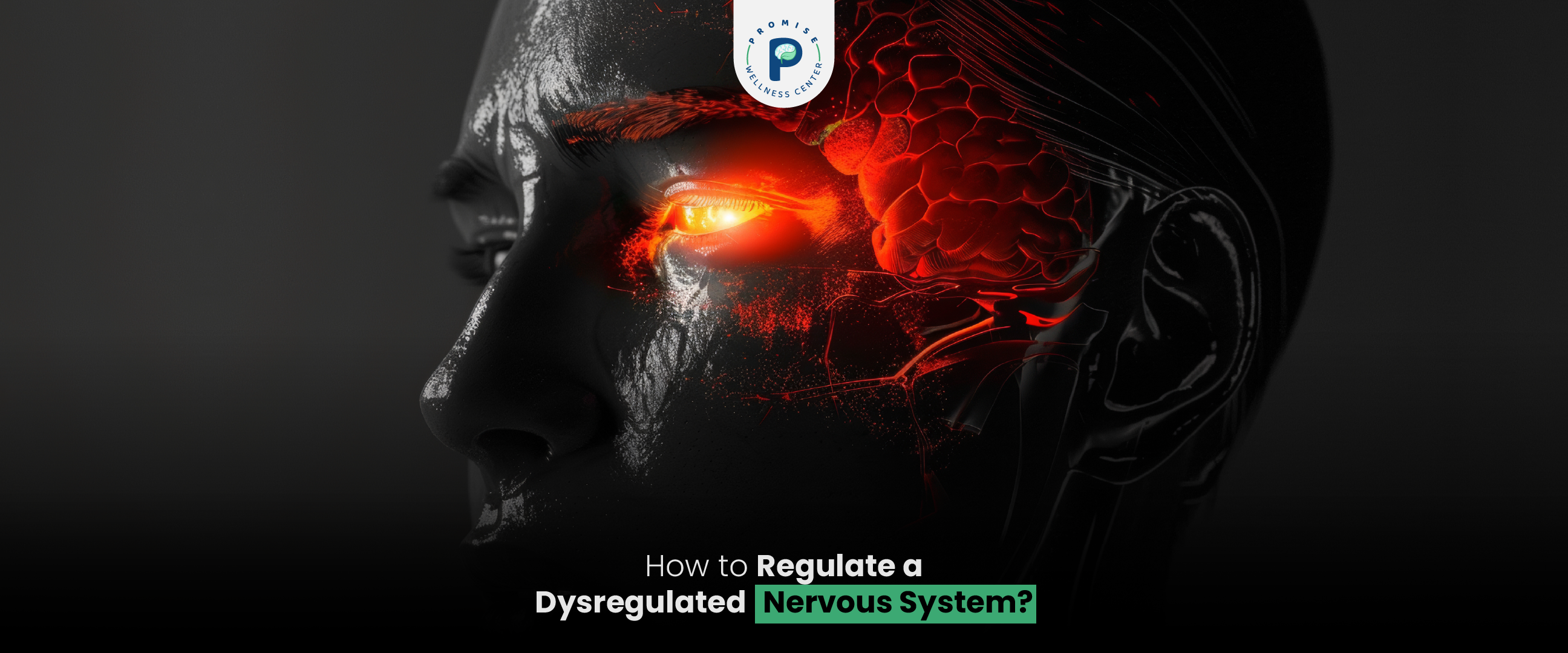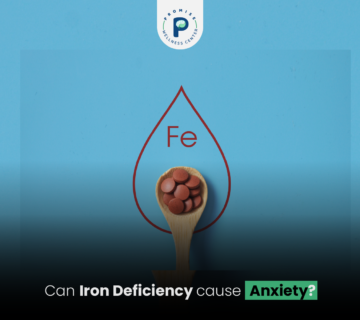Today, many people struggle with an unbalanced nervous system. This system is vital for our physical and mental health.
However, stress, trauma, or prolonged emotional strain can disrupt it. Hence, we may face rising worry, continuous stress, or even physical discomfort.
So, it’s essential to learn how to regulate a dysregulated nervous system for better health. Now, let’s explore some steps and techniques to regain balance and calm.
At Promise Wellness Center, we treat all mental health issues. Our team provides empathetic listening, personalized care, and custom plans for your well-being. For more information, please contact us.
What Is the Nervous System and Its Function?
The nervous system is a vital network of cells and organs. It helps manage and control the body’s actions.
It oversees details from our senses, sends messages to muscles and body parts, and keeps a balance in the body. The nervous system is split into two main parts.
- The central nervous system, or CNS, which has the brain and spinal cord.
- The peripheral nervous system, or PNS. This has nerves running all over the body.
Both these parts work together. They manage actions we do on purpose like moving around. They also handle actions we don’t control like heart rate, food digestion, and breathing. It helps the body respond right to inside and outside forces.
Understanding Nervous System Dysregulation
Is nervous system dysregulation real? There’s a genuine disorder called nervous system dysregulation. It troubles numerous folks and leads to a mix of physical and mental signs.
It happens when the body’s stress or trauma level rises and stays high for a good length of time.
If stress persists, it keeps our bodies on edge. This constant state of “ready to act” can bring about worry and panic. It might also result in physical impacts like headaches or stomach troubles.
On the other hand, a well-adjusted nervous system easily changes between peace and alertness. This harmony helps our bodies work efficiently, enhancing wellness and strength against stress.
One of the building blocks of the nervous system is the balance between the sympathetic and parasympathetic branches.
- Sympathetic: It’s the fight or flight system.
- Parasympathetic: It’s the rest and digest system.
Balancing these two systems is vital for health. The key to fixing a disrupted system is restoring harmony between them.
Signs of Nervous System Dysregulation
Before discussing how to regulate a dysregulated nervous system, we must first recognize its signs. Here are common signs:
- Persistent anxiety or fear
- Feeling “on edge” or hyper-alert
- Difficulty sleeping or relaxing
- Digestive issues (as the nervous system is responsible for stimulating digestion)
- Chronic pain or fatigue
- Emotional numbness or dissociation
- Shutting down emotionally (nervous system collapse)
Recognizing these signs can help you spot a dysregulated nervous system. This allows you to take steps to heal and recover.
What to Do When the Nervous System Collapses?
Our nervous system can get overwhelmed by stress or trauma, causing it to “turn off.” This is a protective measure.
But, when the nervous system collapses, it can lead to feelings of disconnection, confusion, or extreme tiredness. To recover, start by adding calming activities to your day.
Begin with simple practices like deep breathing. Then, gradually move to more active methods like exercise.
How to Regulate a Dysregulated Nervous System?
Trauma can significantly impact the nervous system, leading to prolonged stress and dysregulation. Some tips will help guide you on how to reset your nervous system after trauma.
To reset your nervous system after trauma, consider the following strategies:
- Vagus Nerve Reset Meditation: Pay attention to mindfulness exercises centered around the Vagus nerve to help handle stress. These habits help relax your body’s automatic stress responses, boosting inner calmness and toughness.
- Healing Nervous System Techniques: Balance your nervous system through gentle movement. Yoga and tai chi offer healing benefits. These practices soothe mind and body, promoting wellness and inner calm.
- Somatic Reset: Feel your body. Tune into sensations. Use somatic techniques to recalibrate your nerves. Find equilibrium through mindful movement and touch-based therapies.
Exercises to Stimulate the Vagus Nerve
The Vagus nerve is a key player in nervous system regulation. Here are some exercises to stimulate the Vagus nerve:
- Deep Breathing: Breathe slowly and deeply. This can kick-start your Vagus nerve and get you relaxed.
- Vagus Nerve Tapping Points: Delicately tap your body at specific spots. It can wake up your Vagus nerve and soothe the nervous system.
- Cold Contact: A quick, cold shower can prod the Vagus nerve into action.
Vagus Nerve Pressure Point Hand
There’s also a method using a Vagus nerve pressure point hand. Simply press gently at certain hand spots that touch base with the Vagus nerve. It can shut down the nervous system and swing you back to relaxation.
How to Recover CNS Faster?
For those recovering from a nervous system collapse or extreme stress, knowing how to recover CNS faster is key. Focus on:
- Get enough sleep for CNS recovery.
- Eating nutrient-rich foods helps healing.
The Importance of Co-Regulation
We don’t control our nerves alone. Usually, we depend on those near us for help.
This idea, called co-regulation of the autonomic nervous system, tells us how bonds and social talks can help us keep steady.
Friendly, helpful talks can soothe a disturbed system, while unwanted or stressed relationships can make signs worse.
Making a group of helpful pals, kin, or a counselor can be a strong aid as you work towards nerve system recovery.
Ways to Keep the Nervous System Healthy
Some ways to keep your nervous system healthy with these tips:
- Exercise Often: This keeps your nervous system humming and your brain in tip-top shape.
- Eat Right: Balance your diet with nerve-boosting nutrients like omega-3s, antioxidants, and vitamins.
- Sleep Well: Good sleep means good nerve repair and sharp thinking.
- Beat Stress: Use mindfulness, meditation, or deep breathing to ease your nerves.
- Drink Up: Your nerves love when you sip on water!
- Brain Games: Try things that make your mind work, like puzzles or picking up a new skill.
- Say No To Toxin: Stay away from stuff that harms your nerves, like too much alcohol and certain drugs.
- Make Friends: Good social times help your mental health and lower stress.
- Get Routine Health Checks: Keep tabs on chronic issues that could hurt your nervous system.
Best Herbs for the Nervous System
When it comes to balancing the nervous system, consider valerian root, ashwagandha, and chamomile. They’re top-notch natural soothers.
Not only do they chill out your nerves, but they also improve overall health. Think of them as nature’s way to beat stress and feel better.
Conclusion
Knowing how to regulate a dysregulated nervous system is key to total health. Vagus nerve stimulation, staying mindful, and physical activity can help balance your body.
These methods assist in recovering from shock, strain, or emotional excess. Regularity is key for a sound nervous system.
Regular activities keep you balanced and prevent issues. Your nervous system is resilient. With the right tools, you can support its healing and health.
FAQs
What signs point to problems with my nervous system?
Possible clues are ongoing feelings. These include unexpected discomfort, a lack of sensation, and noticeable tingling. Also, watch for big shifts in your mood or thinking.
How can I tell if my nervous system is healing?
Better sleep, reduced anxiety, and steadier emotions signal progress. Notice these telling improvements. Also, watch for a drop in muscle tension and fatigue.
What are neuro-sympathetic reset techniques?
Neuro-sympathetic reset strategies aim to restore balance in your nervous system. Techniques like easy yoga and breath control exercises can help. They promote relaxation and reduce stress.






No comment